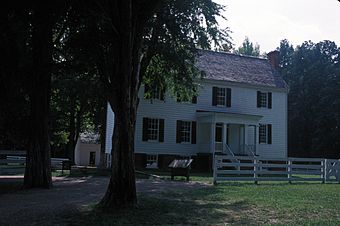Petersburg Breakthrough Battlefield facts for kids
|
Petersburg Breakthrough Battlefield
|
|

Tudor Hall
|
|
| Location | Jct. of Duncan and Boydton Plank Rds., Petersburg, Virginia |
|---|---|
| NRHP reference No. | 06000239 |
Quick facts for kids Significant dates |
|
| Added to NRHP | February 17, 2006 |
|
Petersburg Breakthrough Battlefield Historic District at Pamplin Historical Park
|
|
| Lua error in Module:Location_map at line 420: attempt to index field 'wikibase' (a nil value). | |
| Location | 6125 Boydton Plank Rd., 6619 Duncan Rd., Petersburg, Virginia |
|---|---|
| Built | 1864 |
| Architect | C.S. Army |
| Architectural style | Greek Revival, Gothic Revival |
| NRHP reference No. | 03001095 |
| Significant dates | |
| Added to NRHP | October 22, 2003 |
| Designated HD | February 17, 2006 |
The Petersburg Breakthrough Battlefield is an important historical site. It is located in Dinwiddie County, Virginia, near the city of Petersburg, Virginia. This place was the scene of a major battle during the American Civil War.
On April 2, 1865, the Union Army fought the Confederate Army here. The Union soldiers managed to break through the Confederate lines. These lines were protecting the cities of Petersburg and Richmond, Virginia. This victory was a huge turning point in the war.
Because of this breakthrough, Confederate General Robert E. Lee had to leave Richmond. His army began to retreat. Just one week later, he surrendered at Appomattox Court House National Historical Park. This event effectively ended the Civil War.
Today, parts of this battlefield are protected. Some areas were added to the National Register of Historic Places in 2003. A different, but overlapping, part was named a National Historic Landmark in 2006. Much of the battlefield is now part of Pamplin Historical Park. This park is open to the public. It helps people learn about the battle with trails, displays, and history programs.
Contents
Exploring the Battlefield Today
The Petersburg Breakthrough Battlefield is located southwest of Petersburg. It covers a large area of land. You can find it near United States Route 1 and Virginia State Route 670. The battlefield is next to Petersburg National Battlefield.
Confederate Defenses and Camps
The preserved parts of the battlefield show old Confederate earthworks. These are like long, protective walls made of dirt. They are some of the best-preserved ones from the Civil War. You can also see where Confederate camps were located behind these earthworks. There are also "rifle pits," which were small trenches dug by soldiers. Some of these pits were taken over by Union forces during the battle.
The defenses also included dams. These dams helped control water around the battle lines. On one side of Arthur Swamp, the Confederates built a large fort called a "redan." It was placed on a high point for a better view.
Historic Buildings and Park Features
Today, the battlefield area includes recreated Confederate log cabins. These cabins show what the soldiers' winter homes looked like. Pamplin Historical Park also has other features. The Hart House, built around 1859-1861, has been restored. It looks much like it did during the war. There's also Tudor Hall, an older house from about 1812. This house stood just outside the main battle area.
Protecting the Battlefield
The Petersburg Breakthrough Battlefield has two important historical designations. In 2003, the "Petersburg Breakthrough Battlefield Historic District at Pamplin Historical Park" was listed on the National Register of Historic Places. This area covers about 422 acres. It includes Pamplin Historical Park and some nearby properties.
In 2006, a larger area of over 647 acres was named a National Historic Landmark. This special title means it's a very important place in American history. This landmark area includes more land next to Pamplin Park. It focuses on the parts of the land directly involved in the battle.
See also
 | Janet Taylor Pickett |
 | Synthia Saint James |
 | Howardena Pindell |
 | Faith Ringgold |



